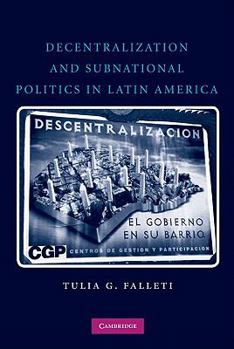Decentralization and Subnational Politics in Latin America
Select Format
Select Condition 
Book Overview
Is it always true that decentralization reforms put more power in the hands of governors and mayors? In postdevelopmental Latin America, the surprising answer to this question is no. In fact, a variety of outcomes are possible, depending largely on who initiates the reforms, how they are initiated, and in what order they are introduced. Tulia G. Falleti draws on extensive fieldwork, in-depth interviews, archival records, and quantitative data to explain the trajectories of decentralization processes and their markedly different outcomes in Argentina, Brazil, Colombia, and Mexico. In her analysis, she develops a sequential theory and method that are successful in explaining this counterintuitive result. Her research contributes to the literature on path dependence and institutional evolution and will be of interest to scholars of decentralization, federalism, subnational politics, intergovernmental relations, and Latin American politics.
Format:Paperback
Language:English
ISBN:0521736358
ISBN13:9780521736350
Release Date:April 2010
Publisher:Cambridge University Press
Length:312 Pages
Weight:0.99 lbs.
Dimensions:0.8" x 6.0" x 8.9"
Customer Reviews
0 rating





